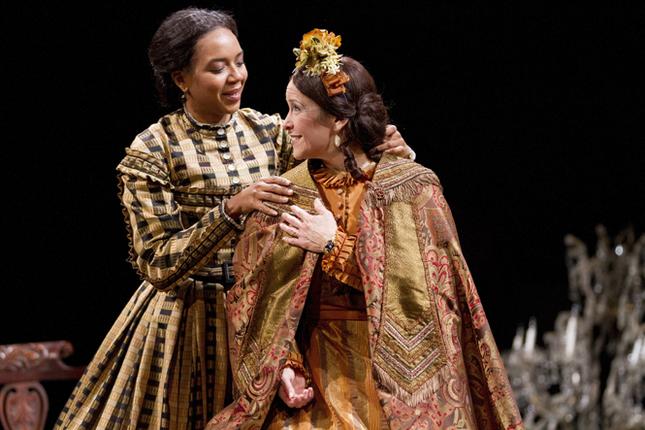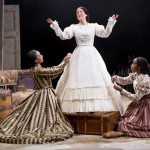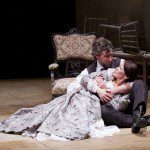‘Mary T. and Lizzy K.’: an Intimate Lincoln Story
By • September 12, 2013 0 1803

Just when you thought you had gotten tired of Abraham Lincoln and Mary Todd Lincoln, and Mary Todd’s seamstress Elizabeth Keckley and Steven Spielberg’s “Lincoln,” along comes Tazewell Thompson’s deeply affecting new play “Mary T. and Lizzy K.” And you are moved all over again.
Watching Naomi Jacobson as Mary Todd Lincoln, Sameerah Luqmaan Harris as Keckley, Thomas Adrian Simpson as Lincoln as well as Joy Jones as Ivy, Keckley’s youthful assistant at the Kogod Cradle at Arena Stage makes you at times think of the omni-present film, but it is, of course, hardly like watching the movie.
Thompson, a director at Arena Stage for many years, has done something almost unimaginable: he has re-imagined, re-shaped our views, pictures and feelings about these familiar and iconic people who loom so large in our memory’s imaginings without traumatizing long-held feelings. “Mary T. and Lizzy K.” is a labor of digging deeper, closer to the heart and bone about not only the history-held people but also our notions about them and the larger shadows of slavery, race, obligation and married love and marriage, intimacy and friendship. This production becomes for the audience something personal and intimate—we all have our feelings about these subjects and these people, certainly Lincoln and his wife Mary Todd, singular and together, and certainly race. All of us will see on stage some part of our joys and wounds and confusions of thought.
The relationship between Mary and Lizzie seems to front and center here. The two have, in a way, as much an intimate relationship as the Lincolns did. No one seems more intimate than the woman who pulls, pushes, contours and shapes a dress to the body, which is what Keckley did for all of the Lincoln’s White House years. She did so well enough that she herself gained some measure of fashion fame that was available in that day.
We see Mary Todd Lincoln in the drab, prison-like clothes of an asylum patient or inmate and Keckley, splendid in outbursting dress, has come to visit and to demand payment from Mary for all her years of work dressing the first lady, for which she was never recompensed.
This is in some ways a time machine play, a memory play. Soon enough, we are back on the night—victory won, war is over—that the Lincolns are preparing to go Ford’s Theatre. In the scene, they are unaware of Lincoln’s last night alive. There are fittings, there is Keckley’s assistant Ivy affectingly telling the story of her rape and there is Mary’s boiling jealousy over one, any and all.
The narrative—really in some ways a series of soliloquies, long stories and arguments and exchanges—returns infrequently to the asylum, to the making of accounts, to the ties that bind between Keckley and Mary Todd where even arguments over fashion and style can bring out wounding words.
When Lincoln—performed with a burst of gusto initially by Thomas Avery Simpson (he was Colonel Pickering in the recent Arena production of “My Fair Lady”)—makes his first appearance the play threatens for a moment to become “Abraham Lincoln and Mary Todd and Lizzie K and Ivy.” He appears to be not only trying to win over all three women but the audience as well.
When Lincoln and Naomi Jacobson in a bravura performance as Mary launch into a knock-down, drag-out brawl—very much like that between Daniel Day Lewis and Sally Field in the film—it is just as shocking, only more so, because they threaten to involve us, spill off the stage like fighters in a ring.
But the steady rock throughout these proceedings—it’s more than an hour-and-a-half without intermission—is Sameerah Luqmaan Harris as Keckley. She has horror stories and points of view and losses, but she brings them to the forefront obliquely with grace and tart, dark humor. Even when she is in a scene merely watching and listening, you always sense her presence. Check it to see what is happening in that intense but serene and beautiful face. This woman is shy and very judicious with her emotions. She is watchful and observing at all times. When she breaks out with her view of heaven, it’s like a burst of sunlight bathing us all. It’s an accomplished performance—accomplished with few obvious tools.
If you’ve seen the movie “Lincoln,” this play will once again show up the obvious—that being here is different than being at the multiplex or watching a DVD. However brilliant, for instance, the performance of Daniel Day Lewis, it is locked up forever. At Arena, this Lincoln seems to be emerging before our eyes. You become in the theater a witness, not a consumer.
Thompson writes beautifully, with no fear of poetry, and with great compassion for human suffering—even the thoroughly combative and paranoid Mary Todd gets her glorious due here. The play is aided and abetted by Donald Eastman’s set which is at once functional and contains hidden wonders. Tt’s a place of starkness with left-over physical discarded memories—a trunk, curtains and boxes and briefcases, containing the stuff for dressmaking and discovery.
Wherever you sit during the course of this play, it seemed to me and felt to me, that you were only an emotion away from wanting to be a little closer, to help them, as they try to stop the story from moving forward to its appointment and to its opening scene.
- Sameerah Luqmaan-Harris as Elizabeth Keckly and Naomi Jacobson as Mary Todd Lincoln in Arena Stage at the Mead Center for American Theater’s production of “Mary T. & Lizzy K.” through April 28. | Scott Suchman
- Nora Birch




